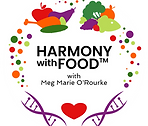Polyphenols for Gut Health
- Meg O'Rourke
- Apr 13, 2023
- 2 min read
This week on the Harmony With Food Radio Show, I talked about why your acid reflux may be caused by too little stomach acid, rather than too much, and the benefits of polyphenols for your microbiome.
Low Stomach Acid
When you are put on a PPI (proton pump inhibitor) for acid reflux, it can actually cause hypochlorhydria or low stomach acid. Our stomach acid also naturally declines as we age because the parietal cells in the stomach lining produce less stomach acid. Studies show that about half of all people over age 60 and 80% of people over the age of 85 have low stomach acid.
Side Effects of Low Stomach Acid
When our stomach's pH is too high, it inhibits pepsin, which is essential for the digestion of protein, and inhibits the absorption of many minerals. Stomach acid also provides our first line of defense against food poisoning, H. pylori, parasites, and other infections.
Without adequate stomach acid, we leave ourselves at risk and open to decreased immune resistance and a variety of other health problems, like deficiencies in B12, Vitamin C, iron, calcium, magnesium, zinc, and copper.
Symptoms of Low Stomach Acid
The symptoms of low stomach acid are very similar to those caused by having too much stomach acid, which is why I recommend microbiome testing that will actually test the pH of your stool. Here are some of the symptoms to watch out for:
Bloating
Belching
Burning and gas immediately after eating
A sense of fullness after eating
Indigestion
Diarrhea
Constipation
Nausea
Presence of parasites, candida, yeast, or small intestinal bacterial overgrowth
Causes of Low Stomach Acid
Here are a few things that can cause low stomach acid:
Pernicious anemia
Chronic H. Pylori infection
Long-term PPI treatment
Autoimmune gastritis
Type IV Mucolipidosis
Diseases Associated with Low Stomach Acid
There are many diseases that are associated with low stomach acid, here are a few:
Addison's Disease
Asthma
Celiac Disease
Chronic autoimmune diseases
Chronic Hives/Dermatitis
Gluten sensitivity
Diabetes
Eczema
Gallbladder disease
Grave's Disease
Hepatitis
Hyper and hypothyroidism
Lupus
Osteoporosis
Anemia
Psoriasis
Rheumatoid Arthritis
Rosacea
I can help treat low stomach acid with nutraceuticals through my BioUnique Boutique program. Click HERE to schedule a free 45-minute call with me to get started.

Polyphenols
Polyphenols are a group of chemicals that occur naturally in plants. There are about 500 unique polyphenols that are collectively known as phytochemicals. They can be categorized by into the following groups:
Phenolic acids
Flavonoids
Stilbenes
Lignans
Effect of Polyphenols on the Microbiome
Eating more polyphenol-rich foods has been shown to create an optimal gut bacterial balance, which in turn can reduce your risk for many diseases. If you have a decreased abundance of beneficial gut bacteria, which we can determine through testing, increasing your intake of polyphenol-rich foods is one thing you can do to improve your gut bacteria.
Here are some of the effects of polyphenols on the microbiome:
Helps increase bifidobacteria and lactobacillus, while reducing firmicutes, which helps with weight loss
Helps decrease calprotectin, an indicator of inflammation, and E. Coli, a pathogenic bacteria
Increases bacterial diversity
Increases short chain fatty acids, which are important for gut health
Polyphenol-Rich Foods
A few foods you can find polyphenols in are:
Cocoa powder and dark chocolate
Peppermint
Oregano
Elderberry
Rosemary
Capers
Pecans
Black olives
Plums
Thyme
Chestnuts
Cloves
Green tea
Curcumin
Red grapes and wine
Pomegranate





.png)























Comments